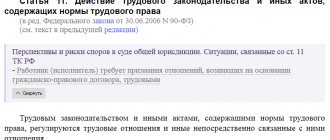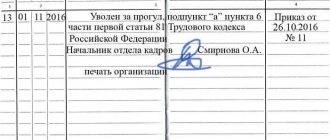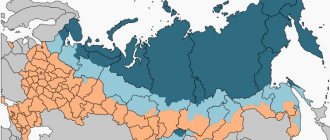Until the laws and other regulatory legal acts in force on the territory of the Russian Federation are brought into compliance with this Code, laws and other legal acts of the Russian Federation, as well as legislative and other regulatory legal acts of the former USSR in force on the territory of the Russian Federation within the limits and in the manner , which are provided for by the Constitution of the Russian Federation, Resolution of the Supreme Council of the RSFSR dated December 12, 1991 N 2014-1 “On the ratification of the Agreement on the creation of the Commonwealth of Independent States”, apply to the extent that they do not contradict this Code. Regulatory legal acts of the President of the Russian Federation, the Government of the Russian Federation issued before the entry into force of this Code and decrees of the USSR Government applied on the territory of the Russian Federation on issues that, in accordance with this Code, can only be regulated by federal laws, are valid until the entry into force of the relevant federal laws .
Commentary on Article 423 of the Labor Code of the Russian Federation
In accordance with the first paragraph of Article 423 of the Labor Code of the Russian Federation, pending the bringing of laws and other regulatory legal acts in force on the territory of the Russian Federation into conformity with the Labor Code of the Russian Federation, laws and other legal acts of the Russian Federation are applied to the extent that they do not contradict the Labor Code of the Russian Federation.
Article 423 of the Labor Code of the Russian Federation determines: on issues that can only be regulated by federal laws, decisions of the USSR Government continue to apply until the relevant federal laws are enacted. Let's say that the Rules on regular and additional leaves approved by the People's Commissariat of Labor of the USSR on April 30, 1930 are still applied. In particular, when it comes to calculating the number of days of compensation for unused vacation upon dismissal.
Article 312.1 of the Labor Code of the Russian Federation. General provisions
Remote work is the performance of a labor function determined by an employment contract outside the location of the employer, its branch, representative office, other separate structural unit (including those located in another locality), outside a stationary workplace, territory or facility directly or indirectly under the control of the employer, provided use of public information and telecommunication networks, including the Internet, to perform this job function and to carry out interaction between the employer and employee on issues related to its implementation. Remote workers are considered to be persons who have entered into an employment contract for remote work. Remote workers are subject to labor legislation and other acts containing labor law norms, taking into account the specifics established by this chapter. If this chapter provides for the interaction of a remote worker or a person applying for remote work and an employer through the exchange of electronic documents, enhanced qualified electronic signatures of the remote worker or a person applying for remote work and the employer are used in the manner established by federal laws and other regulatory legal acts of the Russian Federation. Each of the parties to this exchange is obliged to send in the form of an electronic document confirmation of receipt of the electronic document from the other party within the period specified in the employment contract for remote work. In cases where, in accordance with this Code, an employee must be familiarized in writing, including against signature, with adopted local regulations directly related to his work activities, orders (instructions) of the employer, notifications, requirements and other documents, remote the employee can be familiarized with them by exchanging electronic documents between the employer and the remote worker. In cases where, in accordance with this Code, an employee has the right or obligation to contact the employer with a statement, provide the employer with explanations or other information, a remote worker can do this in the form of an electronic document. To provide mandatory insurance coverage for compulsory social insurance in case of temporary disability and in connection with maternity, the remote worker sends to the employer the original documents provided for by federal laws and other regulatory legal acts of the Russian Federation by registered mail with notification. When a remote worker submits an application for the issuance of duly certified copies of documents related to work (this Code), the employer, no later than three working days from the date of filing the said application, is obliged to send these copies to the remote worker by registered mail with notification or, if specified in application in the form of an electronic document.
Another comment on Art. 423 Labor Code of the Russian Federation
1. The procedure for applying on the territory of the Russian Federation the normative legal acts of the USSR, the RSFSR and the Russian Federation, issued before the entry into force of the Labor Code, established in this article, obliges each subject of law enforcement, forced to refer to the norms contained in such acts, to ensure that they have legal force. To do this, he needs to establish the fact that this act does not contradict the requirements of Part 3 of Art. 55 of the Constitution of the Russian Federation, norms of the Labor Code, norms of labor law contained in other federal laws, decrees of the President and resolutions of the Government of the Russian Federation, as well as in regulatory legal acts of federal executive authorities.
2. Undoubted assistance in this matter can be provided by decisions of the Constitutional Court and the Supreme Court of the Russian Federation, issued on issues of constitutionality and applicability of norms contained in specific sources of labor law.
Commentary on Article 423 of the Labor Code of the Russian Federation
1. In connection with the adoption of the Labor Code, it was necessary to bring laws and other regulatory legal acts in force on the territory of the Russian Federation into conformity with it.
Part 1 of the commented article contains the rule that laws and other regulatory legal acts in force on the territory of the Russian Federation are applied to the extent that they do not contradict the Labor Code. The application of this provision means that it is necessary to compare the norms of the Labor Code with the norms of other laws and other normative legal acts, to make a judgment about whether the norms of other acts contradict the Code and, accordingly, whether they are subject to application.
2. Since the option of determining the legal force of a normative legal act at the legislative level is more convenient and preferable for law enforcement, Art. 2 of Law No. 90-FZ of June 30, 2006, the following regulatory legal acts (provisions of regulatory legal acts) of the USSR are recognized as not valid on the territory of the Russian Federation:
1) Decree of the Presidium of the Supreme Soviet of the USSR of December 13, 1956 “On strengthening labor protection for teenagers”;
2) Law of the USSR of February 11, 1957 “On approval of the Decree of the Presidium of the Supreme Soviet of the USSR “On strengthening labor protection for adolescents”;
3) Law of the USSR of May 7, 1960 “On the completion of the transfer in 1960 of all workers and employees to a seven- and six-hour working day”;
4) Law of the USSR of July 15, 1970 No. 2-8 “On approval of the Fundamentals of the Legislation of the USSR and Union Republics on Labor”;
3. The norm of part 2 of the commented article is aimed at preventing the emergence of gaps in legal regulation.
Commentary on Article 60.2 of the Labor Code of the Russian Federation
The article under comment describes for the first time in the Labor Code the concept of additional work, which should be understood as a combination of professions (positions); expansion of service areas, increase in the volume of work; performance of duties of a temporarily absent employee without release from work specified in the employment contract.
Additional work is entrusted by the employer and can only be done with the written consent of the employee. Additional work can be assigned by the employer either in a different profession or in the same profession (position) for an additional fee (see Article 151 of the Labor Code and commentary thereto).
Unlike part-time work, additional work is performed during regular working hours within the framework of an existing employment contract.
The combination of professions (positions) should be understood as the performance by an employee, along with his main work stipulated by the employment contract, of additional work in another profession (position). Performing such work is possible due to the intensity (condensation of work) during the working day.
As a rule, options for possible combination of professions (positions) are fixed in a collective agreement or other local act.
The current legislation in some cases provides for the retention of a temporarily absent employee’s place of work and position, for example, in the event of his illness, being on vacation, etc. Assigning an employee, without releasing him from his main job, to perform the duties of an absent employee is the performance of the duties of a temporarily absent employee.
It should be borne in mind that such performance of duties can be either in a different or in the same profession (position), since the employee is not released from his main job during the performance of duties, he performs the duties of a temporarily absent employee within the established working hours by condensing their work.
In each specific case, the employer issues an order to assign the employee other additional work. The order specifies the period during which the employee will perform additional work, the content of this work, as well as the volume of additional work performed.
However, it should be borne in mind that such an order will be legal if the employee gives written consent to perform additional work.
The amount of additional payments is also indicated in the order and is established by agreement of the parties, taking into account the content and (or) volume of additional work (see Article 151 of the Labor Code and commentary thereto).
Since the performance of additional work is established by agreement of the parties, the employee may refuse such work ahead of schedule, and the employer may cancel his assignment to perform it ahead of schedule, notifying the other party in writing no later than three working days in advance.
Article 423. Application of laws and other normative legal acts
Until the laws and other regulatory legal acts in force on the territory of the Russian Federation are brought into compliance with this Code, laws and other legal acts of the Russian Federation, as well as legislative and other regulatory legal acts of the former USSR in force on the territory of the Russian Federation within the limits and in the manner , which are provided for by the Constitution of the Russian Federation, Resolution of the Supreme Council of the RSFSR dated December 12, 1991 N 2014-I “On the ratification of the Agreement on the creation of the Commonwealth of Independent States”, apply to the extent that they do not contradict this Code.
Regulatory legal acts of the President of the Russian Federation, the Government of the Russian Federation issued before the entry into force of this Code and decrees of the USSR Government applied on the territory of the Russian Federation on issues that, in accordance with this Code, can only be regulated by federal laws, are valid until the entry into force of the relevant federal laws .
This is interesting: Article 210 of the Labor Code of the Russian Federation 2021
Article 312.3 of the Labor Code of the Russian Federation. Features of the organization and labor protection of remote workers
The procedure and terms for providing remote workers with equipment, software and hardware, information security tools and other means necessary to fulfill their duties under an employment contract for remote work, the procedure and terms for remote workers to submit reports on work performed, the amount, procedure and terms for payment of compensation for the use by remote workers of equipment owned or leased by them, software and hardware, information security tools and other means, the procedure for reimbursement of other expenses associated with remote work is determined by the employment contract on remote work. In order to ensure safe conditions and labor protection for remote workers, the employer fulfills the duties provided for by this Code, and also familiarizes remote workers with labor protection requirements when working with equipment and tools recommended or provided by the employer. Other obligations of the employer to ensure safe conditions and labor protection established by this Code, other federal laws and other regulatory legal acts of the Russian Federation, laws and other regulatory legal acts of the constituent entities of the Russian Federation do not apply to remote workers, unless otherwise provided by the employment contract on remote work. work.
Commentary to Art. 423 Labor Code of the Russian Federation
1. This article establishes the procedure for applying on the territory of the Russian Federation laws and other regulatory legal acts of the Russian Federation in force before the adoption of the Labor Code of the Russian Federation. as well as legislative acts of the former USSR, indicating the possibility of applying such acts to the extent that does not contradict the Labor Code of the Russian Federation.
2. Subordinate regulatory legal acts (acts of the President of the Russian Federation, the Government of the Russian Federation, the Government of the USSR) on issues that, in accordance with the Labor Code, can only be regulated by federal laws, are valid until the relevant federal laws come into force.
Second commentary to Article 423 of the Labor Code
1. Part 1 of the commented article formulates the rule that, pending the bringing of laws and other normative legal acts that are in force on the territory of the Russian Federation, in accordance with the Labor Code, laws and other legal acts of the Russian Federation, as well as legislative and other normative acts of the former The USSR, operating on the territory of the Russian Federation within the limits and in the manner provided for by the Constitution of the Russian Federation, the Resolution of the Supreme Council of the RSFSR of December 12, 1991 “On the Ratification of the Agreement on the Creation of the CIS”, are applied to the extent that they do not contradict this Code.
This rule ensures a certain continuity in the legal regulation of labor relations. It should be remembered that modern labor legislation was created gradually. Thus, the issue of application or non-application of the provisions of the former Union legislation should be decided in each specific case, taking into account the content of the norm and its comparison with Russian labor legislation.
2. Part 2 of this article of the Code states that subordinate regulatory legal acts (decrees of the President of the Russian Federation, resolutions of the Government of the Russian Federation, as well as resolutions of the Government of the USSR) on issues that, in accordance with this Code, can only be regulated by federal laws, will continue to be in force , but before the relevant federal laws come into force.
Labor Code of the Labor Code of the Russian Federation
Part six
Section 14. Final provisions
Article 420. Time limits for the entry into force of this Code
This Code comes into force on February 1, 2002.
Article 421. Procedure and terms for introducing the minimum wage provided for in part one of Article 133 of this Code
(as amended by Federal Law dated April 20, 2007 N 54-FZ)
The procedure and timing for a gradual increase in the minimum wage to the amount provided for in part one of Article 133 of this Code are established by federal law.
Article 422. Recognition of certain legislative acts as invalid
The following shall be declared invalid as of February 1, 2002:
Code of Labor Laws of the RSFSR, approved by the Law of the RSFSR of December 9, 1971 “On approval of the Code of Labor Laws of the RSFSR” (Gazette of the Supreme Council of the RSFSR, 1971, No. 50, Art. 1007);
Decree of the Presidium of the Supreme Soviet of the RSFSR of March 15, 1972 “On the procedure for enacting the Code of Labor Laws of the RSFSR” (Gazette of the Supreme Council of the RSFSR, 1972, No. 12, Art. 301);
Decree of the Presidium of the Supreme Soviet of the RSFSR of September 20, 1973 “On amending Article 240 of the Labor Code of the RSFSR” (Vedomosti of the Supreme Council of the RSFSR, 1973, No. 39, Art. 825);
Law of the RSFSR of December 19, 1973 “On approval of the Decrees of the Presidium of the Supreme Council of the RSFSR, introducing some changes and additions to the current legislation of the RSFSR” (Vedomosti of the Supreme Council of the RSFSR, 1973, No. 51, Art. 1110) regarding the approval of the Decree of the Presidium of the Supreme Council of the RSFSR dated September 20, 1973 “On amendments to Article 240 of the Labor Code of the RSFSR”;
Decree of the Presidium of the Supreme Soviet of the RSFSR of July 23, 1974 “On introducing amendments and additions to the Labor Code of the RSFSR” (Gazette of the Supreme Council of the RSFSR, 1974, No. 30, Art. 806);
Law of the RSFSR of August 2, 1974 “On approval of the Decrees of the Presidium of the Supreme Council of the RSFSR, introducing some changes and additions to the current legislation of the RSFSR” (Vedomosti of the Supreme Council of the RSFSR, 1974, No. 32, Art. 854) regarding the approval of the Decree of the Presidium of the Supreme Council of the RSFSR dated July 23, 1974 “On amendments and additions to the Labor Code of the RSFSR”;
Decree of the Presidium of the Supreme Soviet of the RSFSR of December 30, 1976 “On introducing amendments and additions to the Labor Code of the RSFSR” (Gazette of the Supreme Council of the RSFSR, 1977, No. 1, Art. 1);
Law of the RSFSR of July 20, 1977 “On approval of the Decrees of the Presidium of the Supreme Council of the RSFSR, introducing some changes and additions to the current legislation of the RSFSR” (Vedomosti of the Supreme Council of the RSFSR, 1977, No. 30, Art. 725) regarding the approval of the Decree of the Presidium of the Supreme Council of the RSFSR dated December 30, 1976 “On amendments and additions to the Labor Code of the RSFSR”;
Decree of the Presidium of the Supreme Council of the RSFSR of January 15, 1980 “On amendments to Article 31 of the Labor Code of the RSFSR” (Vedomosti of the Supreme Council of the RSFSR, 1980, No. 3, Art. 68);
Law of the RSFSR of March 26, 1980 “On approval of the Decrees of the Presidium of the Supreme Council of the RSFSR on introducing amendments and additions to some legislative acts of the RSFSR” (Vedomosti of the Supreme Council of the RSFSR, 1980, No. 14, Art. 352) regarding the approval of the Decree of the Presidium of the Supreme Council of the RSFSR dated January 15, 1980 “On amendments to Article 31 of the Labor Code of the RSFSR”;
Decree of the Presidium of the Supreme Soviet of the RSFSR of August 12, 1980 “On introducing amendments and additions to the Labor Code of the RSFSR” (Gazette of the Supreme Council of the RSFSR, 1980, No. 34, Art. 1063);
Law of the RSFSR of November 20, 1980 “On approval of the Decrees of the Presidium of the Supreme Council of the RSFSR on introducing amendments and additions to the Criminal, Criminal Procedure and Civil Procedure Codes of the RSFSR, to the Labor Code of the RSFSR” (Vedomosti of the Supreme Council of the RSFSR, 1980, No. 48, Art. 1597) regarding the approval of the Decree of the Presidium of the Supreme Soviet of the RSFSR of August 12, 1980 “On introducing amendments and additions to the Labor Code of the RSFSR”;
Decree of the Presidium of the Supreme Soviet of the RSFSR of November 19, 1982 “On Amendments to the Labor Code of the RSFSR” (Gazette of the Supreme Soviet of the RSFSR, 1982, No. 47, Art. 1725);
Law of the RSFSR of December 1, 1982 “On approval of the Decrees of the Presidium of the Supreme Council of the RSFSR on introducing amendments and additions to some legislative acts of the RSFSR” (Vedomosti of the Supreme Council of the RSFSR, 1982, No. 49, Art. 1830) regarding the approval of the Decree of the Presidium of the Supreme Council of the RSFSR dated November 19, 1982 “On Amendments to the Labor Code of the RSFSR”;
Decree of the Presidium of the Supreme Soviet of the RSFSR of December 20, 1983 “On introducing amendments and additions to the Labor Code of the RSFSR” (Gazette of the Supreme Council of the RSFSR, 1983, No. 51, Art. 1782);
Law of the RSFSR of January 6, 1984 “On approval of the Decrees of the Presidium of the Supreme Council of the RSFSR on introducing amendments and additions to some legislative acts of the RSFSR” (Vedomosti of the Supreme Council of the RSFSR, 1984, No. 2, Art. 73) regarding the approval of the Decree of the Presidium of the Supreme Council of the RSFSR dated December 20, 1983 “On amendments and additions to the Labor Code of the RSFSR”;
paragraph 1 of the Decree of the Presidium of the Supreme Council of the RSFSR of January 18, 1985 “On introducing amendments and additions to some legislative acts of the RSFSR” (Vedomosti of the Supreme Council of the RSFSR, 1985, No. 4, Art. 117);
Section IV of the Decree of the Presidium of the Supreme Soviet of the RSFSR dated May 28, 1986 “On introducing amendments and additions to some legislative acts of the RSFSR” (Vedomosti of the Supreme Soviet of the RSFSR, 1986, No. 23, Art. 638);
paragraph 1 of the Decree of the Presidium of the Supreme Soviet of the RSFSR of November 19, 1986 “On some changes in the procedure for collecting alimony for minor children” (Gazette of the Supreme Soviet of the RSFSR, 1986, No. 48, Art. 1397);
Article 2 of the Law of the RSFSR of July 7, 1987 “On introducing amendments and additions to some legislative acts of the RSFSR” (Gazette of the Supreme Council of the RSFSR, 1987, No. 29, Art. 1060);
Decree of the Presidium of the Supreme Soviet of the RSFSR of September 29, 1987 “On introducing amendments and additions to the Labor Code of the RSFSR” (Gazette of the Supreme Council of the RSFSR, 1987, No. 40, Art. 1410);
Law of the RSFSR of October 30, 1987 “On approval of the Decrees of the Presidium of the Supreme Council of the RSFSR on introducing amendments and additions to some legislative acts of the RSFSR” (Vedomosti of the Supreme Council of the RSFSR, 1987, No. 45, Art. 1553) regarding the approval of the Decree of the Presidium of the Supreme Council of the RSFSR dated September 29, 1987 “On amendments and additions to the Labor Code of the RSFSR”;
Decree of the Presidium of the Supreme Soviet of the RSFSR of February 5, 1988 “On introducing amendments and additions to the Labor Code of the RSFSR” (Gazette of the Supreme Council of the RSFSR, 1988, No. 6, Art. 168);
Decree of the Presidium of the Supreme Soviet of the RSFSR of March 31, 1988 “On introducing amendments and additions to the Labor Code of the RSFSR” (Vedomosti of the Supreme Council of the RSFSR, 1988, No. 14, Art. 395);
Law of the RSFSR of April 20, 1988 “On approval of Decrees of the Presidium of the Supreme Council of the RSFSR on introducing amendments and additions to some legislative acts of the RSFSR” (Vedomosti of the Supreme Council of the RSFSR, 1988, No. 17, Art. 541) regarding the approval of Decrees of the Presidium of the Supreme Council of the RSFSR dated February 5, 1988 “On amendments and additions to the Labor Code of the RSFSR” and March 31, 1988 “On amendments and additions to the Labor Code of the RSFSR”;
Law of the RSFSR of April 19, 1991 N 1028-1 “On increasing social guarantees for workers” (Vedomosti of the Congress of People's Deputies of the RSFSR and the Supreme Soviet of the RSFSR, 1991, N 17, Art. 506);
Resolution of the Supreme Council of the RSFSR dated April 19, 1991 N 1029-1 “On the procedure for enacting the Law of the RSFSR “On increasing social guarantees for workers” (Gazette of the Congress of People's Deputies of the RSFSR and the Supreme Council of the RSFSR, 1991, N 17, Art. 507);
Article 3 of the RSFSR Law of December 6, 1991 N 1991-1 “On increasing the minimum wage” (Vedomosti of the Congress of People's Deputies of the RSFSR and the Supreme Soviet of the RSFSR, 1991, N 51, Art. 1797);
Law of the Russian Federation of March 12, 1992 N 2502-1 “On Amendments to the Labor Code of the RSFSR” (Gazette of the Congress of People's Deputies of the Russian Federation and the Supreme Council of the Russian Federation, 1992, N 14, Art. 712);
Law of the Russian Federation of September 25, 1992 N 3543-1 “On introducing amendments and additions to the Labor Code of the RSFSR” (Gazette of the Congress of People's Deputies of the Russian Federation and the Supreme Council of the Russian Federation, 1992, N 41, Art. 2254);
Law of the Russian Federation of December 22, 1992 N 4176-1 “On introducing amendments to Article 65 of the Labor Code of the Russian Federation” (Gazette of the Congress of People's Deputies of the Russian Federation and the Supreme Council of the Russian Federation, 1993, N 1, Art. 16);
Article 5 of the Law of the Russian Federation of March 30, 1993 N 4693-1 “On the minimum wage” (Gazette of the Congress of People's Deputies of the Russian Federation and the Supreme Council of the Russian Federation, 1993, N 16, Art. 553);
paragraph 2 of Article 1 of the Federal Law of January 27, 1995 N 10-FZ “On introducing amendments and additions to certain legislative acts of the Russian Federation in connection with the adoption of the Law of the Russian Federation “On the status of military personnel” (Collected Legislation of the Russian Federation, 1995, N 5, Art. 346);
Federal Law of February 15, 1995 N 14-FZ “On Amendments to Article 163 of the Labor Code of the Russian Federation” (Collected Legislation of the Russian Federation, 1995, N 8, Art. 599);
Article 1 of the Federal Law of July 18, 1995 N 109-FZ “On Amendments and Additions to the Labor Code of the Russian Federation, Fundamentals of the Legislation of the Russian Federation on Labor Protection, the RSFSR Code of Administrative Offenses and the Criminal Code of the RSFSR” (Collection of Legislation of the Russian Federation , 1995, N 30, Art. 2865);
Article 1 of the Federal Law of August 24, 1995 N 152-FZ “On introducing amendments and additions to certain legislative acts of the Russian Federation in connection with the adoption of the Federal Law “On State Benefits for Citizens with Children” (Collected Legislation of the Russian Federation, 1995, N 35 , art. 3504);
Federal Law of November 24, 1995 N 182-FZ “On Amendments and Additions to the Labor Code of the Russian Federation” (Collected Legislation of the Russian Federation, 1995, N 48, Art. 4564);
Federal Law of November 24, 1996 N 131-FZ “On Amendments and Additions to the Labor Code of the Russian Federation” (Collected Legislation of the Russian Federation, 1996, N 49, Art. 5490);
Federal Law of March 17, 1997 N 59-FZ “On Amendments and Additions to Article 213 of the Labor Code of the Russian Federation” (Collected Legislation of the Russian Federation, 1997, N 12, Art. 1382);
Federal Law of May 6, 1998 N 69-FZ “On introducing amendments and additions to Article 15 of the Labor Code of the Russian Federation” (Collected Legislation of the Russian Federation, 1998, N 19, Art. 2065);
paragraph 1 of Article 30 of the Federal Law of July 24, 1998 N 125-FZ “On compulsory social insurance against accidents at work and occupational diseases” (Collected Legislation of the Russian Federation, 1998, N 31, Art. 3803);
Federal Law of July 31, 1998 N 139-FZ “On introducing amendments and additions to Article 235 of the Labor Code of the Russian Federation” (Collected Legislation of the Russian Federation, 1998, N 31, Art. 3817);
Federal Law of April 30, 1999 N 84-FZ “On Amendments and Additions to the Labor Code of the Russian Federation” (Collected Legislation of the Russian Federation, 1999, N 18, Art. 2210);
Article 1 of the Federal Law of December 27, 2000 N 151-FZ “On introducing an amendment to Article 251 of the Labor Code of the Russian Federation and supplementing Article 23.1 of the Law of the Russian Federation “On state guarantees and compensation for persons working and living in the Far North and localities equivalent to them" (Collection of Legislation of the Russian Federation, 2001, No. 1, Art. 3);
Federal Law of January 18, 2001 No. 2-FZ “On introducing amendments to Article 65 of the Labor Code of the Russian Federation” (Collected Legislation of the Russian Federation, 2001, No. 4, Art. 274);
Federal Law of July 10, 2001 N 90-FZ “On Amendments to Article 168 of the Labor Code of the Russian Federation” (Collected Legislation of the Russian Federation, 2001, N 29, Art. 2945).
Other laws and other regulatory legal acts in force on the territory of the Russian Federation are subject to being brought into conformity with this Code.
Article 423. Application of laws and other normative legal acts
Until the laws and other regulatory legal acts in force on the territory of the Russian Federation are brought into compliance with this Code, laws and other legal acts of the Russian Federation, as well as legislative and other regulatory legal acts of the former USSR in force on the territory of the Russian Federation within the limits and in the manner , which are provided for by the Constitution of the Russian Federation, Resolution of the Supreme Council of the RSFSR dated December 12, 1991 N 2017-1 “On the ratification of the Agreement on the creation of the Commonwealth of Independent States”, apply insofar as they do not contradict this Code.
(as amended by Federal Law No. 90-FZ of June 30, 2006)
Regulatory legal acts of the President of the Russian Federation, the Government of the Russian Federation issued before the entry into force of this Code and decrees of the USSR Government applied on the territory of the Russian Federation on issues that, in accordance with this Code, can only be regulated by federal laws, are valid until the entry into force of the relevant federal laws .
Article 424. Application of this Code to legal relations that arose before and after its entry into force
This Code applies to legal relations arising after its entry into force.
If legal relations arose before the entry into force of this Code, then it applies to those rights and obligations that arise after its entry into force.
The president
Russian Federation
V. PUTIN
Moscow Kremlin
December 30, 2001
N 197-FZ








